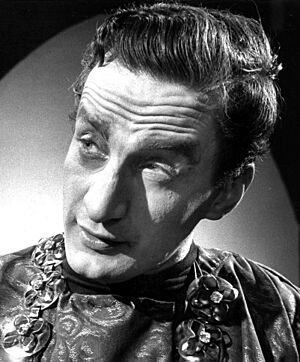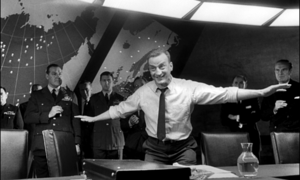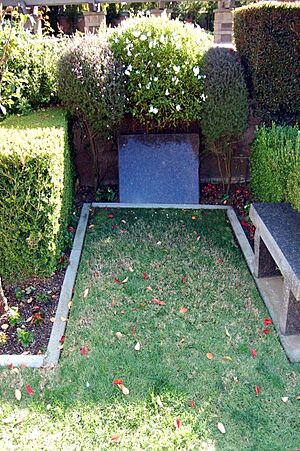George C. Scott facts for kids
Quick facts for kids
George C. Scott
|
|
|---|---|
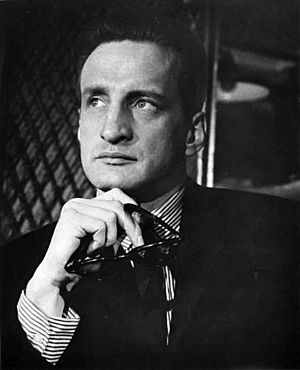
Scott in The Hustler (1961)
|
|
| Born |
George Campbell Scott
October 18, 1927 Wise, Virginia, U.S.
|
| Died | September 22, 1999 (aged 71) |
| Resting place | Westwood Village Memorial Park Cemetery |
| Education | Redford High School |
| Alma mater | University of Missouri (B.A., 1953) |
| Occupation |
|
| Years active | 1951–1999 |
| Spouse(s) |
|
| Children | 7, including Devon and Campbell Scott |
George Campbell Scott (born October 18, 1927 – died September 22, 1999) was an American actor, director, and producer. He had a very successful career in both movies and on stage.
Scott was known for playing strong, serious, but often complex characters. Some of his famous roles include prosecutor Claude Dancer in Anatomy of a Murder, General Buck Turgidson in Stanley Kubrick's Dr. Strangelove, and Ebenezer Scrooge in A Christmas Carol. He also played General George S. Patton in the movie Patton, for which he won an Academy Award for Best Actor.
The Guardian newspaper called him "a battler and an actor of rare courage." His performances earned him many awards, including a Golden Globe, a Genie Award, and two Primetime Emmys.
Scott first became well-known as a stage actor in New York. He earned his first of four Oscar nominations for his second film role in Anatomy of a Murder. He quickly became a movie star with lead roles in films like The Hustler (1961) and Dr. Strangelove (1964).
Even though he won the Best Actor Oscar for Patton, he was the first actor to refuse the award. He had told the Academy of Motion Picture Arts and Sciences beforehand that he would not accept it. Scott believed that every acting performance was special and could not be compared to others.
Scott continued to act a lot on stage, even as his movie career became less active. By the end of his life, he had five Tony nominations for his stage work. He also directed several of his own films and plays. He often worked with his wives, Colleen Dewhurst and Trish Van Devere.
Contents
George C. Scott's Early Life
George Campbell Scott was born on October 18, 1927, in Wise, Virginia. He was the younger of two children. His mother, Helena Agnes, passed away just before his eighth birthday. His father, George Dewey Scott, who worked as an executive at Buick, then raised him.
When he was young, Scott wanted to be a writer, like his favorite author, F. Scott Fitzgerald. He wrote many short stories while attending Redford High School in Detroit. However, none of them were ever published. He also tried to write novels but never finished one that he was happy with.
After high school, Scott joined the United States Marine Corps. He served from 1945 to 1949. His main job was to be an honor guard at military funerals. These funerals took place at Arlington National Cemetery in Washington, D.C..
After his time in the military, Scott went to the University of Missouri. He used the G.I. Bill to pay for his studies. He first studied journalism but then became very interested in drama. His first public acting role was in a university play called The Winslow Boy. He graduated from the university in 1953 with degrees in English and theater.
George C. Scott's Acting Career
Starting on Stage and Screen
George C. Scott first became famous for his work with the Joseph Papp's New York Shakespeare Festival. In 1958, he won an Obie Award for his acting. This was for his roles in Children of Darkness, As You Like It, and for playing the main character in William Shakespeare's Richard III. One critic even said his Richard III was the "angriest" ever seen.
Scott's first appearance on Broadway was in a play called Comes a Day (1958). It did not run for very long. He also made his television debut in 1958 in a show called A Tale of Two Cities. He appeared in other TV shows like Kraft Theatre and Omnibus. Scott's first movie role was in The Hanging Tree (1959).
Taking on Supporting Roles
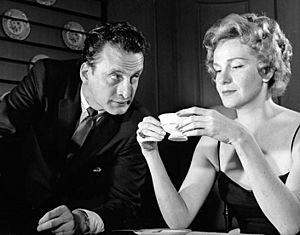
Scott earned his first Academy Award nomination for his role in Anatomy of a Murder (1959). Later that year, he appeared on Broadway in The Andersonville Trial. He received great reviews for playing the prosecutor in this play. The play was based on a real military trial from the American Civil War.
Scott also got good reviews for his role in The Wall (1960–61). He appeared as a guest star on many TV shows. These included Playhouse 90 and Hallmark Hall of Fame. Scott received excellent reviews for his acting in the movie The Hustler (1961). He then went back to Broadway to direct a play called General Seeger, but it only had two performances.
In 1962, Scott played a school teacher on the TV show The Virginian. He also appeared in a medical drama called The Eleventh Hour. He acted alongside famous actors like Laurence Olivier in a TV production of The Power and the Glory (1961).
Becoming a Star
Scott's first main role in a movie was in The List of Adrian Messenger (1963). That same year, he starred in a TV drama series called East Side/West Side. He played a social worker in New York City. Scott had a big influence on the show, which sometimes led to disagreements with the head of CBS. The show won an Emmy Award but was canceled after one season.
One of Scott's most famous early roles was in the movie Dr. Strangelove, or How I Learned to Stop Worrying and Love the Bomb (1964). He played General "Buck" Turgidson. The director, Stanley Kubrick, wanted Scott to act in a very over-the-top way. Scott didn't want to at first, but Kubrick tricked him into doing it during rehearsals by pretending the cameras were off. Scott was also one of many stars in The Yellow Rolls-Royce (1964).
In 1966, Scott was in the movie The Bible: In the Beginning, directed by John Huston. He also appeared in the TV western The Road West. He co-starred with Tony Curtis in the comedy film Not with My Wife, You Don't! (1966). In 1967, he played John Proctor in a TV version of The Crucible.
Scott returned to Broadway in 1967 to direct a play, but he left during rehearsals. As an actor, he appeared in a play called The Little Foxes (1967–68). Scott also starred in the movies The Flim-Flam Man (1967) and Petulia (1968).
Playing General Patton
Scott played George S. Patton in the movie Patton (1970). He did a lot of research for the role, watching films of the general and talking to people who knew him. Scott refused the Oscar nomination for Patton, just as he had done for his nomination in 1962 for The Hustler. However, he still won the award.
In a letter to the Motion Picture Academy, he explained that he did not feel he was in competition with other actors. The Best Picture Oscar for Patton was later given to the George C. Marshall Foundation Library in Lexington, Virginia. Scott did accept the New York Film Critics Award. His wife at the time, Colleen Dewhurst, said, "George thinks this is the only film award worth having."
Roles in the 1970s
In the early 1970s, Scott appeared in TV movies like Jane Eyre (1970) as Mr. Rochester. He also starred in The Price (1971), based on an Arthur Miller play. For this role, he won an Emmy Award, which he did accept. He also directed a TV version of The Andersonville Trial (1970).
Scott then focused on movies again. He was in They Might Be Giants (1971) and The Last Run (1971). He had a big success with The Hospital (1971) and The New Centurions (1972).
Scott then appeared in several movies that did not do well at the box office. These included Rage (1972), which he also directed. Other films were Oklahoma Crude (1973), The Day of the Dolphin (1973), and The Savage Is Loose (1974), which he also directed. Scott returned to TV in Fear on Trial (1975) and starred in the disaster movie The Hindenburg (1975).
Returning to the Stage
Scott had a very successful Broadway play with Neil Simon's Plaza Suite (1968). The show had three short plays, all using the same set, and Scott played a different main character in each. It ran for over 1,000 performances. Scott directed a play called All God's Chillun Got Wings (1975). He also directed and played Willy Loman in a 1975 revival of Death of a Salesman, earning another Tony nomination.
Scott received a Tony Award nomination for his role in Uncle Vanya (1973). He also starred in a popular play called Sly Fox (1976). In 1980, he was in Tricks of the Trade on Broadway, but it only ran for one performance. However, he directed a successful Broadway play called Design for Living in 1984. In 1993, he had a successful off-Broadway play called Wrong Turn at Lungfish.
Television and Later Film Roles
Scott appeared in a TV production of Beauty and the Beast (1976). He later starred in Islands in the Stream (1977), based on a novel by Ernest Hemingway. He had a small role in Crossed Swords (1977) and then the lead in Movie Movie (1978).
Scott starred in The Changeling (1980), for which he won a Canadian Genie Award. He then made The Formula (1980), which was not successful. This was mostly his last lead role in a major studio movie.
Scott appeared with Timothy Hutton and young actors Sean Penn and Tom Cruise in the movie Taps (1981). He also played Fagin in a TV movie of Charles Dickens' Oliver Twist (1982). On Broadway, he starred in and directed a successful play called Present Laughter (1982–83). In 1984, he had a supporting role in Firestarter. He also played Ebenezer Scrooge in a TV movie of A Christmas Carol, earning an Emmy nomination. Scott played Benito Mussolini in the TV movie Mussolini: The Untold Story (1985).
Scott played Patton again in a TV movie sequel, The Last Days of Patton (1986). This movie showed the final weeks of Patton's life after a car accident. Scott mentioned in an interview that he had told the Academy to donate his Oscar to the Patton Museum.
On TV, Scott was in The Murders in the Rue Morgue (1986) and Pals (1987). He also played the main role in the TV series Mr. President (1987–88). In 1989, Scott starred in the TV film The Ryan White Story. In 1990, he voiced two bad guy characters: Smoke in Cartoon All-Stars to the Rescue and Percival McLeach in the Disney film The Rescuers Down Under.
1990s Performances
Scott was in the movie The Exorcist III (1990). For TV, he starred in Descending Angel (1990) and Finding the Way Home (1991). On Broadway, he directed and appeared in a play called On Borrowed Time (1991–92). He had supporting roles in Curacao (1993) and Malice (1993). Scott had a starring role in the TV series Traps (1994), but it only lasted five episodes. He also had a role in another short-lived series New York News (1995). Around this time, Scott appeared in movies like The Whipping Boy (1994), Tyson (1995), and Angus (1995).
Final Roles
Scott received another Tony nomination for his role in a play called Inherit the Wind (1996). In this play, he often had to miss performances because of illness. In 1996, he received an honorary Drama Desk Award for his dedication to theater.
On TV, he was in Country Justice (1996) and Titanic (1996), where he played the ship's captain. Scott played Juror No. 3 in the TV movie 12 Angry Men (1997). This was the same role played by Lee J. Cobb in the 1957 film. For this role, Scott won another Emmy Award.
He hosted a show called Weapons at War on A&E TV. He had supporting roles in Gloria (1999) and Rocky Marciano (1999). Scott's last film was the TV movie Inherit the Wind (1999). He played Matthew Harrison Brady, with Jack Lemmon as Henry Drummond.
Scott was known for being intense and sometimes unpredictable on set. One story tells that an actress working with him, Maureen Stapleton, told the director, "I don't know what to do – I'm scared of him." The director, Mike Nichols, replied, "My dear, everyone is scared of George C. Scott."
George C. Scott's Family Life
George C. Scott was married five times:
- He married Carolyn Hughes (1951–1955). They had one daughter, Victoria.
- He married Patricia Reed (1955–1960). They had two children, Matthew and actress Devon Scott.
- He married Colleen Dewhurst (1960–1965). They had two sons, writer Alexander Scott and actor Campbell Scott. Colleen Dewhurst called him "G.C."
- He married Colleen Dewhurst again (1967–1972).
- He married Trish Van Devere (1972). They starred in several films together, like The Changeling (1980). Scott met Van Devere while filming The Last Run (1971), which also featured his ex-wife Dewhurst. Scott adopted Van Devere's nephew, George Dressell. They stayed married until Scott's death in 1999.
He also had a daughter named Michelle with Karen Truesdell.
George C. Scott's Political Views
In 1982, Scott appeared in a campaign commercial for a moderate Republican U.S. Senator named Lowell Weicker. Scott lived in Greenwich, Connecticut, at the time, just like Weicker. Scott considered himself a moderate conservative in politics. He supported the death penalty.
Illness and Death
George C. Scott had several heart attacks in the 1980s. He passed away on September 22, 1999, at the age of 71. The cause of his death was a ruptured abdominal aortic aneurysm, which is a serious medical condition involving a major blood vessel. He was buried in the Westwood Village Memorial Park Cemetery in Westwood, California. His grave does not have his name on it, but it is marked.
Partial Filmography
| Year | Title | Role | Notes |
|---|---|---|---|
| 1958 | The DuPont Show of the Month | Jacques | Episode: "A Tale of Two Cities" |
| 1959 | The Hanging Tree | George Grubb | |
| The United States Steel Hour | Marshal Gulliver | Episode: "Trap for a Stranger" | |
| Anatomy of a Murder | Claude Dancer | Nominated—Academy Award for Best Supporting Actor | |
| 1961 | The Hustler | Bert Gordon | Nominated—Academy Award for Best Supporting Actor Nominated—Golden Globe Award for Best Supporting Actor – Motion Picture |
| Ben Casey | Karl Anders | Episode: "I Remember a Lemon Tree" Nominated—Primetime Emmy Award for Outstanding Supporting Actor in a Drama Series |
|
| The Power and the Glory | Police Lieutenant | TV movie | |
| 1962 | Naked City | Kermit Garrison | Episode: "Strike a Statue" |
| 1962 | The Virginian | Arthur Lilly | Episode: "The Brazen Bell" |
| 1963 | The List of Adrian Messenger | Anthony Gethyrn | |
| 1963–1964 | East Side West Side | Neil Brock | 26 episodes Nominated—Primetime Emmy Award for Outstanding Lead Actor in a Drama Series |
| 1964 | Dr. Strangelove or: How I Learned to Stop Worrying and Love the Bomb | General Buck Turgidson | |
| The Yellow Rolls-Royce | Paolo Maltese | ||
| 1966 | The Bible: In the Beginning... | Abraham | |
| Not with My Wife, You Don't! | Colonel "Tank" Martin | ||
| 1967 | The Crucible | John Proctor | TV movie Nominated—Primetime Emmy Award for Outstanding Lead Actor in a Limited or Anthology Series or Movie |
| The Flim-Flam Man | Mordecai Jones | ||
| 1968 | Petulia | Archie Bollen | Nominated—New York Film Critics Circle Award for Best Actor |
| 1969 | This Savage Land | Jud Barker | TV movie |
| 1970 | Patton | General George S. Patton Jr. | Academy Award for Best Actor (Refused) Golden Globe Award for Best Actor – Motion Picture Drama Kansas City Film Critics Circle Award for Best Actor Laurel Award for Best Dramatic Performance, Male National Board of Review Award for Best Actor National Society of Film Critics Award for Best Actor New York Film Critics Circle Award for Best Actor Nominated—BAFTA Award for Best Actor in a Leading Role |
| Jane Eyre | Edward Rochester | TV movie Nominated—Primetime Emmy Award for Outstanding Lead Actor in a Limited or Anthology Series or Movie |
|
| 1971 | The Price | Victor Franz | Hallmark Hall of Fame Primetime Emmy Award for Outstanding Lead Actor in a Limited or Anthology Series or Movie |
| They Might Be Giants | Justin Playfair / "Sherlock Holmes" | Nominated—BAFTA Award for Best Actor in a Leading Role (also for The Hospital) | |
| The Last Run | Harry Garmes | Also starred Colleen Dewhurst and Trish Van Devere | |
| The Hospital | Herbert Bock | Nominated—Academy Award for Best Actor Nominated—BAFTA Award for Best Actor in a Leading Role (also for They Might Be Giants) Nominated—Golden Globe Award for Best Actor – Motion Picture Drama |
|
| 1972 | The New Centurions | Andy Kilvinski | |
| Rage | Dan Logan | Also directed | |
| 1973 | Oklahoma Crude | Noble Mason | |
| The Day of the Dolphin | Jake Terrell | ||
| 1974 | Bank Shot | Walter Upjohn Ballentine | |
| The Savage Is Loose | John | Also directed | |
| 1975 | The Hindenburg | Colonel Franz Ritter | |
| 1976 | Beauty and the Beast | The Beast | TV movie Nominated—Primetime Emmy Award for Outstanding Lead Actor in a Limited or Anthology Series or Movie |
| 1977 | Islands in the Stream | Thomas Hudson | |
| Crossed Swords | The Ruffler | ||
| 1978 | Movie Movie | "Gloves" Malloy / "Spats" Baxter | Nominated—Golden Globe Award for Best Actor – Motion Picture Musical or Comedy |
| 1980 | The Changeling | John Russell | Fantafestival Award for Best Actor Genie Award for Best Performance by a Foreign Actor |
| The Formula | Lieutenant Barney Caine | ||
| 1981 | Taps | Brigadier General Harlan Bache | |
| 1982 | Oliver Twist | Fagin | TV movie |
| 1984 | Firestarter | John Rainbird | |
| A Christmas Carol | Ebenezer Scrooge | TV movie Nominated—Primetime Emmy Award for Outstanding Lead Actor in a Limited or Anthology Series or Movie |
|
| 1985 | Mussolini: The Untold Story | Benito Mussolini | TV movie |
| 1986 | The Last Days of Patton | General George S. Patton Jr. | TV movie |
| The Murders in the Rue Morgue | C. Auguste Dupin | ||
| 1987 | Pals | Jack H. Stobbs / John Livingston Spangler | TV movie |
| 1987–1988 | Mr. President | President Samuel Arthur Tresch | 24 episodes |
| 1989 | The Ryan White Story | Charles Vaughan Sr. | |
| 1990 | Cartoon All-Stars to the Rescue | Smoke | Voice Made for video |
| The Exorcist III | Lieutenant William F. Kinderman | Nominated—Golden Raspberry Award for Worst Actor | |
| The Rescuers Down Under | Percival McLeach | Voice | |
| Descending Angel | Florian Stroia | ||
| 1993 | Curaçao | Cornelius Wettering | |
| Malice | Martin Kessler | ||
| 1994 | Traps | Joe Trapcheck | 5 episodes |
| The Whipping Boy | George "Blind George" | ||
| 1995 | Tyson | Constantine "Cus" D'Amato | |
| Angus | Grandpa Ivan Bethune | ||
| 1996 | Titanic | Captain Edward J. Smith | TV miniseries |
| 1997 | Country Justice | Clayton Hayes | TV movie |
| 12 Angry Men | Juror #3 | TV movie CableACE Award for Best Supporting Actor in a Movie or Miniseries Golden Globe Award for Best Supporting Actor – Series, Miniseries or Television Film Primetime Emmy Award for Outstanding Supporting Actor in a Limited or Anthology Series or Movie Nominated—Screen Actors Guild Award for Outstanding Performance by a Male Actor in a Miniseries or Television Movie |
|
| 1999 | Gloria | Reuben "Ruby" | |
| Rocky Marciano | Pierino Marchegiano | TV movie | |
| Inherit the Wind | Matthew Harrison Brady | TV movie Nominated—Screen Actors Guild Award for Outstanding Performance by a Male Actor in a Miniseries or Television Movie, (final film role) |
Awards and Nominations
See also
 In Spanish: George C. Scott para niños
In Spanish: George C. Scott para niños


